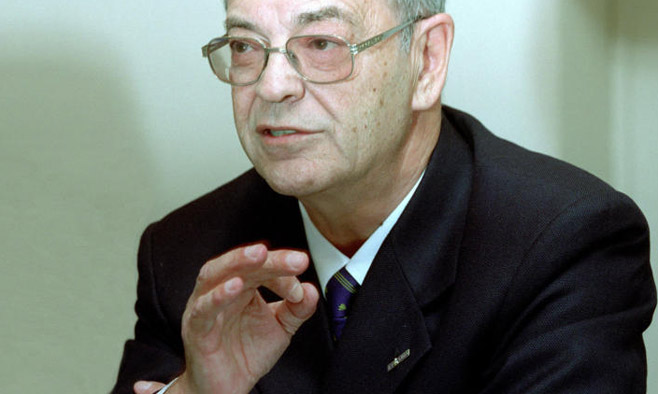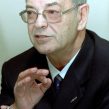
Moscow Restoring Soviet-Style Repression and Aggression
Publication: Eurasia Daily Monitor Volume: 12 Issue: 99
By:

This week (May 26), Russia’s Ministry of Justice added the private charitable foundation Dynasty, which specializes in distributing grants and stipends to Russian scientists, to the register of organizations that the government classifies as “foreign agents.” Another non-governmental organization (NGO), the “Liberal Mission” foundation, headed by renowned economist and former economics minister Yevgeny Yasin (81), was also simultaneously registered as a “foreign agent.” The Dynasty Foundation was founded by Dmitry Zimin (82), a former Soviet defense industry scientist who specialized in designing phased array radar antennas for missile defense, including the gigantic Don-2N radar near Moscow. After the end of the Cold War, Zimin became one of the pioneers in developing mobile phones in Russia. He become the president and CEO of cellphone major Vimpelcom, which he built up from a start-up founded in 1992. In 2001, Zimin sold his stock in Vimpelcom to the Alfa Group of oligarch Mikhail Fridman, retired from business, and created, in 2002, the Dynasty Foundation, which has since been channeling his personal money (some $10 million a year) into supporting science in Russia. Zimin is essentially the sole contributor of funds to the Dynasty Foundation (Vedomosti, May 26).
Russia’s 2012 law on “foreign agents” is designed to prevent foreign-funded NGOs from inspiring popular discontent and threatening President Vladimir Putin’s regime. The law stipulates an NGO is a “foreign agent” if it is involved in “political activity” and receives “foreign funding.” Both these criteria are formulated deliberately vaguely, permitting ecological and human rights organizations to be registered as “foreign agents,” including those with no real foreign backing. Sixty-seven “foreign agent” NGOs allegedly operate in Russia today (Interfax, May 28).
The Dynasty Foundation’s charitable work would be severely disrupted by its new “foreign agent” status: Distributing grants and stipends to scientists and students as well as funding scientific publications and seminars would be practically impossible. All state and publicly funded organizations in Russia, including educational and scientific ones are de facto forbidden to cooperate with or take money from “foreign agents” (Vedomosti, May 26).
Zimin announced he will stop funding the Dynasty Foundation, effectively closing it down if the authorities do not promptly reverse their decision and publicly apologize: “I do not want to act, spending my own money, as if I am an agent of some unknown foreign state.” The possible termination of Dynasty’s charitable activity caused a public outcry and protests from leading scientists and human rights activists. Dynasty Foundation grants—well placed and distributed without excessive administrative red tape—did make a difference for many in Russia’s underfinanced science community (Interfax, May 26).
Initially, there was some hope that branding the Dynasty Foundation a “foreign agent” was a mistake, a thoughtless action by unnamed bureaucrats implementing a bad and vague law. This blunder, the thought went, could perhaps be reversed by a divine intervention from the Kremlin. Putin initially bolstered these hopes of an intervention by the “good tsar.” On May 26, the Russian president was asked about the Dynasty Foundation’s “foreign agent” branding during a closed meeting with representatives of the business association Delovaya Rossyia. Apparently, he expressed some doubt about whether this was a correct decision. At the same time, however, he emphasized overall ignorance about the entire situation (Top.rbc.ru. May 26).
The hopes of a reprieve for the Dynasty Foundation were short lived: Putin’s press secretary Dmitry Peskov scolded the press for “overreaction” and insisted, "it is the law—if someone receives money from abroad, he is a foreign agent” (Interfax, May 26). The justice ministry publicly refused to consider revoking the Dynasty Foundation and Liberal Mission’s “foreign agent” status. Moreover, it has ordered both to be fined for failing to register as “foreign agents” voluntarily (Interfax, May 28).
After selling his Vimpelcom stock, Zimin reportedly moved the bulk of his capital into an offshore trust and was wiring funding to the Dynasty Foundation from abroad—authorities used this practice as a pretext for their ruling (Vedomosti, May 26). Zimin does not deny keeping money abroad, which is not illegal, and insists: “The Russian government also keeps its money [currency reserves] abroad” (Interfax, May 26). Sources in the Kremlin claim the decision to brand the Dynasty Foundation and Liberal Mission as “foreign agents” was a deliberate move. Zimin reportedly has been providing financial assistance to the leftovers of a free press in Russia, like Dozd TV channel and New Times weekly. Also, Zimin has allegedly been funding the Liberal Mission, which the justice ministry accused of organizing lectures and seminars in Moscow about local self-government, national security issues and Putin’s “personified regime.” The Kremlin sees present-day Russia surrounded by enemies and under siege, and Zimin is seen as a threat for being a wealthy liberal who promotes pro-Western subversive ideas. The branding of Zimin’s Dynasty Foundation and Yasin’s Liberal Mission as “foreign agents” is a strong signal for other wealthy Russians who may feel discontented with the rapid transformation of their country into an isolated, quasi-totalitarian state by Putin’s regime and who may harbor ideas of promoting intellectual dissent. Justice Minister Alexander Konovalov told reporters: “It is possible the Foundation [Dynasty] did some good, but that cannot stop the law” (Rbcdail.ru, May 28).
On May 28, the Gorbachev Foundation and former finance minister Alexei Kudrin’s Committee of Civil Initiatives (CGI) presented a paper calling for a new “perestroika”—that is, a political and social linearization of Russia that could reverse the present reincarnation of a Soviet-style authoritarian, repressive and aggressive regime. Speaking at the presentation, Kudrin warned: “A confrontation with the West is leading Russia into a dead end. A weak Russia will not have any new allies, will be technologically and militarily weak” (Top.rbc.ru, May 28). The same day, the Kremlin published the text of President Putin’s ukaz (edict) that declares Russian military casualties “in peace time during special operations” a state secret. Previously, only wartime casualties were secret (Publication.pravo.gov.ru, May 28). The Russian authorities have been struggling to keep under wraps Russian military casualties in fighting in the eastern Ukrainian region of Donbas, insisting against all odds there are no Russian troops deployed in Ukraine. Virtually anything may be designated a “special operation,” and from this day onward, any publication about any possible Donbas casualties is potentially a serious felony. The Kremlin seems to be preparing for more fighting in eastern Ukraine, more casualties, a further escalation in Russia’s confrontation with the West, and the need to silence any attempts at internal dissent, political or otherwise.




